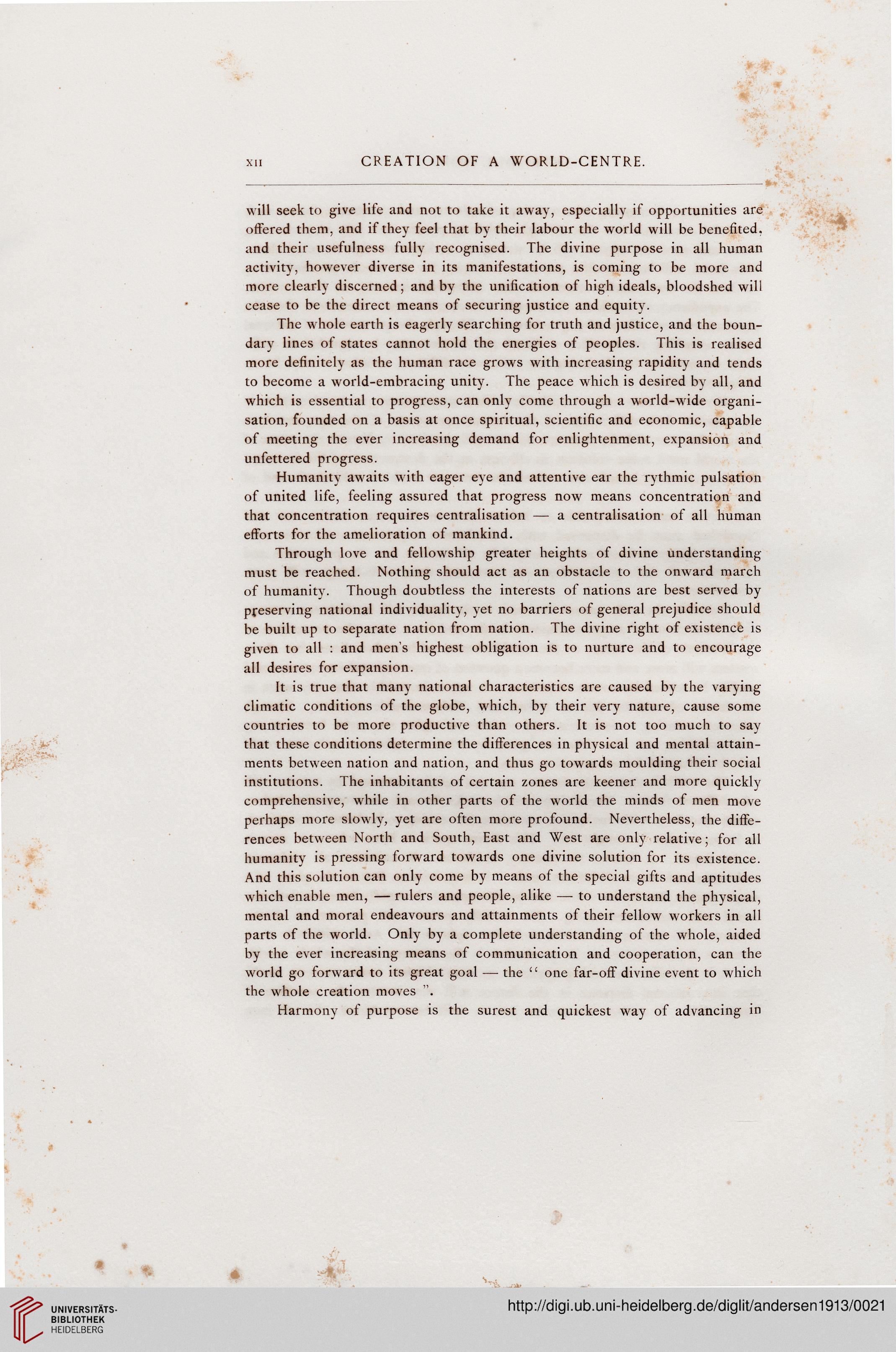xii CREATION OF A WORLD-CENTRE.
will seek to give life and not to take it away, especially if opportunities are
offered them, and if thev feel that by their labour the world will be benefited,
and their usefulness fully recognised. The divine purpose in all human
activity, however diverse in its manifestations, is coming to be more and
more clearly discerned; and by the unification of high ideals, bloodshed will
cease to be the direct means of securing justice and equity.
The whole earth is eagerly searching for truth and justice, and the boun-
dary lines of states cannot hold the energies of peoples. This is realised
more definitely as the human race grows with increasing rapidity and tends
to become a world-embracing unity. The peace which is desired by all, and
which is essential to progress, can only come through a world-wide organi-
sation, founded on a basis at once spiritual, scientific and economic, capable
of meeting the ever increasing demand for enlightenment, expansion and
unfettered progress.
Humanity awaits with eager eye and attentive ear the rythmic pulsation
of united life, feeling assured that progress now means concentration and
that concentration requires centralisation — a centralisation of all human
efforts for the amelioration of mankind.
Through love and fellowship greater heights of divine understanding
must be reached. Nothing should act as an obstacle to the onward march
of humanitv. Though doubtless the interests of nations are best served by
preserving national individuality, yet no barriers of general prejudice should
be built up to separate nation from nation. The divine right of existence is
given to all : and mens highest obligation is to nurture and to encourage
all desires for expansion.
It is true that many national characteristics are caused by the varying
climatic conditions of the globe, which, by their very nature, cause some
countries to be more productive than others. It is not too much to say
that these conditions determine the differences in physical and mental attain-
ments between nation and nation, and thus go towards moulding their social
institutions. The inhabitants of certain zones are keener and more quickly
comprehensive, while in other parts of the wrorld the minds of men move
perhaps more slowly, yet are often more profound. Nevertheless, the diffe-
rences between North and South, East and West are only relative; for all
humanity is pressing forward towards one divine solution for its existence.
And this solution can only come by means of the special gifts and aptitudes
which enable men, — rulers and people, alike — to understand the physical,
mental and moral endeavours and attainments of their fellow workers in all
parts of the world. Only by a complete understanding of the whole, aided
by the ever increasing means of communication and cooperation, can the
world go forward to its great goal — the " one far-off divine event to which
the whole creation moves
Harmony of purpose is the surest and quickest way of advancing in
will seek to give life and not to take it away, especially if opportunities are
offered them, and if thev feel that by their labour the world will be benefited,
and their usefulness fully recognised. The divine purpose in all human
activity, however diverse in its manifestations, is coming to be more and
more clearly discerned; and by the unification of high ideals, bloodshed will
cease to be the direct means of securing justice and equity.
The whole earth is eagerly searching for truth and justice, and the boun-
dary lines of states cannot hold the energies of peoples. This is realised
more definitely as the human race grows with increasing rapidity and tends
to become a world-embracing unity. The peace which is desired by all, and
which is essential to progress, can only come through a world-wide organi-
sation, founded on a basis at once spiritual, scientific and economic, capable
of meeting the ever increasing demand for enlightenment, expansion and
unfettered progress.
Humanity awaits with eager eye and attentive ear the rythmic pulsation
of united life, feeling assured that progress now means concentration and
that concentration requires centralisation — a centralisation of all human
efforts for the amelioration of mankind.
Through love and fellowship greater heights of divine understanding
must be reached. Nothing should act as an obstacle to the onward march
of humanitv. Though doubtless the interests of nations are best served by
preserving national individuality, yet no barriers of general prejudice should
be built up to separate nation from nation. The divine right of existence is
given to all : and mens highest obligation is to nurture and to encourage
all desires for expansion.
It is true that many national characteristics are caused by the varying
climatic conditions of the globe, which, by their very nature, cause some
countries to be more productive than others. It is not too much to say
that these conditions determine the differences in physical and mental attain-
ments between nation and nation, and thus go towards moulding their social
institutions. The inhabitants of certain zones are keener and more quickly
comprehensive, while in other parts of the wrorld the minds of men move
perhaps more slowly, yet are often more profound. Nevertheless, the diffe-
rences between North and South, East and West are only relative; for all
humanity is pressing forward towards one divine solution for its existence.
And this solution can only come by means of the special gifts and aptitudes
which enable men, — rulers and people, alike — to understand the physical,
mental and moral endeavours and attainments of their fellow workers in all
parts of the world. Only by a complete understanding of the whole, aided
by the ever increasing means of communication and cooperation, can the
world go forward to its great goal — the " one far-off divine event to which
the whole creation moves
Harmony of purpose is the surest and quickest way of advancing in





